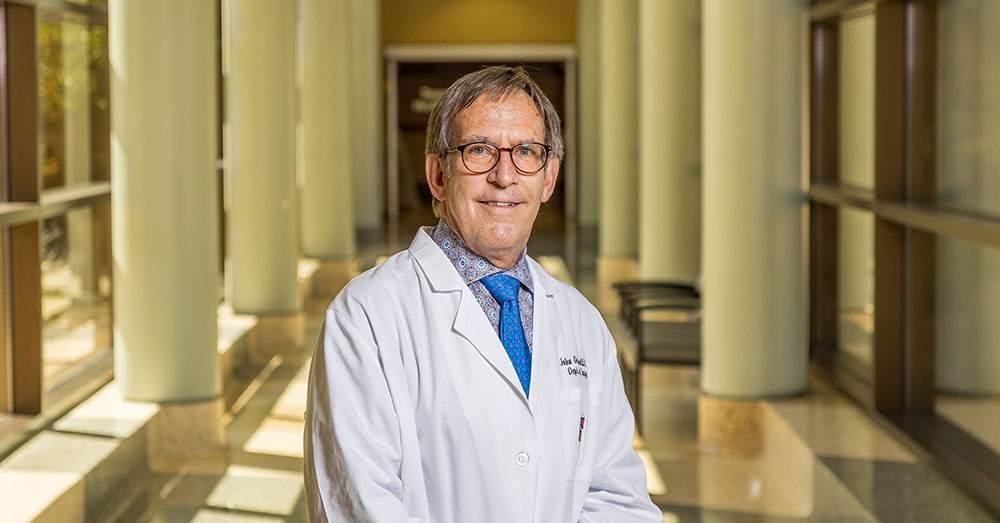Texas Tech Physicians Trauma Surgeon Offers Tips for Ringing in a Safer Holiday Season

As people begin to make plans for the holiday season, thoughts increasingly turn to Thanksgiving dinner, Christmas gifts and traveling to enjoy it all with family and friends. Unfortunately, the holidays also are a time when safety may be overlooked, which means unwanted guests such as accidents and injuries may invite themselves to the festivities.
John Griswold, M.D., executive director of the Texas Tech University Health Sciences Center (TTUHSC) Clinical Research Institute and a surgeon for Texas Tech Physicians, said there are steps people can take to make the holidays as safe as they are fun. Whether planning a large family gathering or a small get-together with friends, Griswold said thinking ahead and slowing down are key when it comes to organizing holiday celebrations.
“You're usually in a hurry and there’s a lot of excitement; your mind is not specifically on things that might hurt you, so you almost have to force yourself to think about that,” he added. “It's not something that you want to think about necessarily, but that few minutes that you do is going to pay off in the long run. And be patient; try not to be too hectic about things because the faster you go and the more hectic you are, the more chance there is for an injury.”
Kitchen Safety and Avoiding the Holiday Burn

Few places are as busy as a holiday kitchen, and injuries related to cooking are among the most common holiday injury. Cooking is probably the most common source for burns and fires, though Griswold said other hazards include fireplaces, space heaters and portable heaters. Tips for reducing the risk of fires, burns and other kitchen injuries during the holidays include:
- Do not leave the kitchen when something is cooking on the stovetop and don't leave the house when the turkey is in the oven. Keep a fire extinguisher nearby if possible.
- Make sure knife handles don't hang over the edge of countertops to reduce the chances of accidental cuts or stabs.
- Don’t leave electrical cords dangling where they can become tripping hazards or where they can get snagged, pulled down inadvertently or grabbed by a child.
- Leave the handles on all cooking vessels turned inward so that a pot of boiling liquid or other hot food doesn’t get knocked off the stovetop.
- Children’s burn injuries spike during the holidays. Griswold recommended they stay at least three to five feet away from the cooking area.
If a small fire does occur, many people will try to put it out themselves even when they don’t have a fire extinguisher. In those cases, Griswold said to never attempt to put a fire out with substances such as flour or water, especially if the fire is in a frying pan. If the fire appears to be out of control, evacuate the home immediately and call 911. “The number one cause of residential fires in the United States is cooking, and that goes way up during the holidays,” Griswold said. “We want everyone to be have fun, so take that [extra] time to make sure the environment is safe.”
Make Safety Part of the Destination
When we make a holiday trip to see family and friends, Griswold said there are steps we can take to make the new environment more comfortable and less stressful.
- Be sure to pack prescription drugs and other medical-related items necessary for your day- to-day wellness. Finding those items quickly in a different town or state might be more difficult, especially during the holidays.
- Always have battery life in your phone for the duration of your trip. Don’t forget to pack charger cords for phones, tablets and computers. When traveling by car with a group, make sure one phone remains as fully charged as possible so there is a reliable lifeline should you get stranded.
- Insist that all adults and older children are buckled up, no matter how long or short the trip, and make sure all small children are secured in car seats.
- Carry a good supply of water and items such as gloves and blankets to keep you warm in case your car heater malfunctions or you get stranded and have to wait several hours for help to arrive.
Griswold also recommended putting together a first aid kit that includes bandages, tape, a tourniquet and superglue. “It's non-toxic, so it won't get into or damage a wound; if you get a cut or tear in your skin, you can actually pull the skin edges together and superglue it and it will basically seal the wound so it can heal underneath. Plus, it's waterproof, so you can glue the wound and then when you bathe or shower the superglue won't come off.”
Decorate with Care
For many, the holidays would not be complete without decorations. Unfortunately, this means the chances of an electrical injury also increase, especially for children. To reduce those risks:
- Carefully inspect all power cords and extension cords for tears or other damage.
- Keep all cords out of the reach of toddlers and small children. Griswold said it’s not uncommon for small children to chew on cords until they break through the insulation, which can cause an electrical burn to the mouth.
- Use ladders according to the manufacturer’s instructions and don’t attempt to climb onto rooftops that you would otherwise avoid the rest of the year.
- Don’t decorate alone. Invite a friend or family member to join in and then help each other with ladder and electrical safety so that nobody ends up in harm’s way.
Gun Safety
As a gift under the tree or something kept around the house for hunting or protection, guns are a part of many households. “You'll have people coming to the house that may not be familiar with things, so if you have guns around, lock them up and make sure they're not easily accessible, especially to children,” Griswold emphasized.
Related Stories
The John Wayne Cancer Foundation Surgical Oncology Fellowship Program at Texas Tech University Health Sciences Center Announced
TTUHSC is collaborating with the John Wayne Cancer Foundation and has established the Big Cure Endowment, which supports the university’s efforts to reduce cancer incidence and increase survivability of people in rural and underserved areas.
Making Mental Health a Priority in the New Year
Sarah Mallard Wakefield, M.D., a psychiatrist with Texas Tech Physicians, talks about strategies to combat widespread and growing anxiety.
TTUHSC Dean to be Inducted into the National Academies of Practice as Distinguished Fellow
Gerard E. Carrino, Ph.D., MPH, dean of the TTUHSC Julia Jones Matthews School of Population and Public Health, will be inducted into the National Academies of Practice (NAP) as a Distinguished Fellow of the Public Health Academy.
Recent Stories
National Academy of Inventors Names TTUHSC Faculty Senior Members
The National Academy of Inventors (NAI) has designated two current and one former TTUHSC faculty researchers as Senior Members.
The John Wayne Cancer Foundation Surgical Oncology Fellowship Program at Texas Tech University Health Sciences Center Announced
TTUHSC is collaborating with the John Wayne Cancer Foundation and has established the Big Cure Endowment, which supports the university’s efforts to reduce cancer incidence and increase survivability of people in rural and underserved areas.
TTUHSC Receives $1 Million Gift from Amarillo National Bank to Expand and Enhance Pediatric Care in the Panhandle
TTUHSC School of Medicine leaders accepted a $1 million philanthropic gift from Amarillo National Bank on Tuesday (Feb. 10), marking a transformational investment in pediatric care for the Texas Panhandle.
